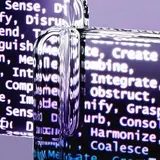Reality-Shaped but Not Real: Exploring Chatbot Trust and Ethical Challenges

How do the “plausible but not factual” tendencies of chatbots impact their trustworthiness? And what ethical concerns arise if chatbots mimic human expression too convincingly?
On his blog, consultant Leon Furze explores how Lewis Carroll's Through the Looking Glass offers a metaphor for understanding Generative AI (GenAI) systems like ChatGPT. In “What Can Lewis Carroll Teach Us About GenAI?,” he draws from a passage in which the White Knight’s convoluted explanation of his song confuses Alice, and this provides a parallel with how chatbots operate. Like the Knight, GenAI outputs are abstract, creating text that seems meaningful, but is actually shaped by probabilities and lacks true understanding or intent. This abstraction mirrors the Knight’s layered descriptions, which are not the song itself, but “song-shaped.”
Furze asserts that GenAI outputs are “fact-shaped” or “reality-shaped,” but not inherently factual or meaningful. This illusion of meaning demands a critical approach from teachers and students alike. To teach effectively with or against AI, teachers will have to focus on critical literacy—helping students interrogate AI outputs while distinguishing between genuine meaning and its imitation. Literature and metaphor, such as Carroll’s whimsical language games, can serve as tools to demystify AI and guide thoughtful engagement with it. Ultimately, Furze advocates for a balanced approach: embracing AI’s potential while critically examining its limitations and implications.
GenAI systems like ChatGPT are already impacting education in significant ways. These tools can generate human-like text and images, and that raises questions about academic integrity and the authenticity of student work. GenAI can also be a valuable tool for both teachers and students, offering new ways to access information and organize our thinking. Understanding GenAI is no longer optional for those of us in education; it’s an essential skill for navigating its challenges and leveraging its potential.